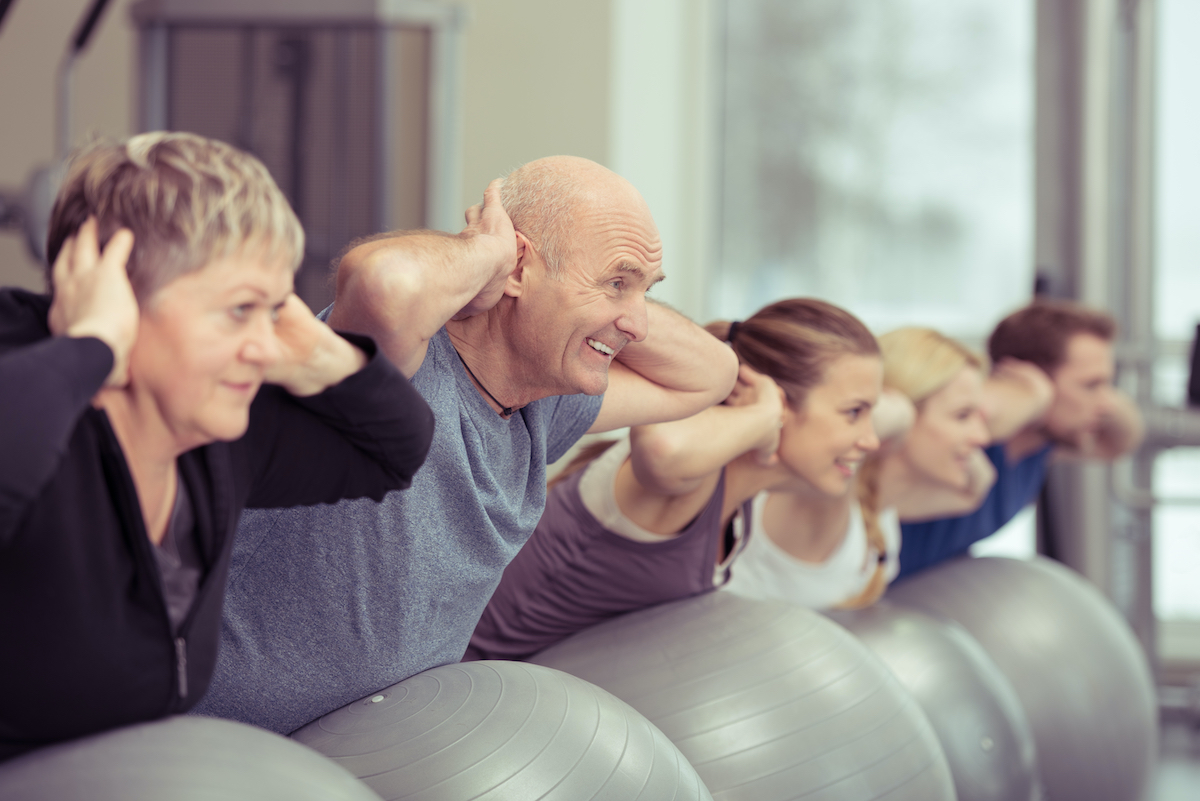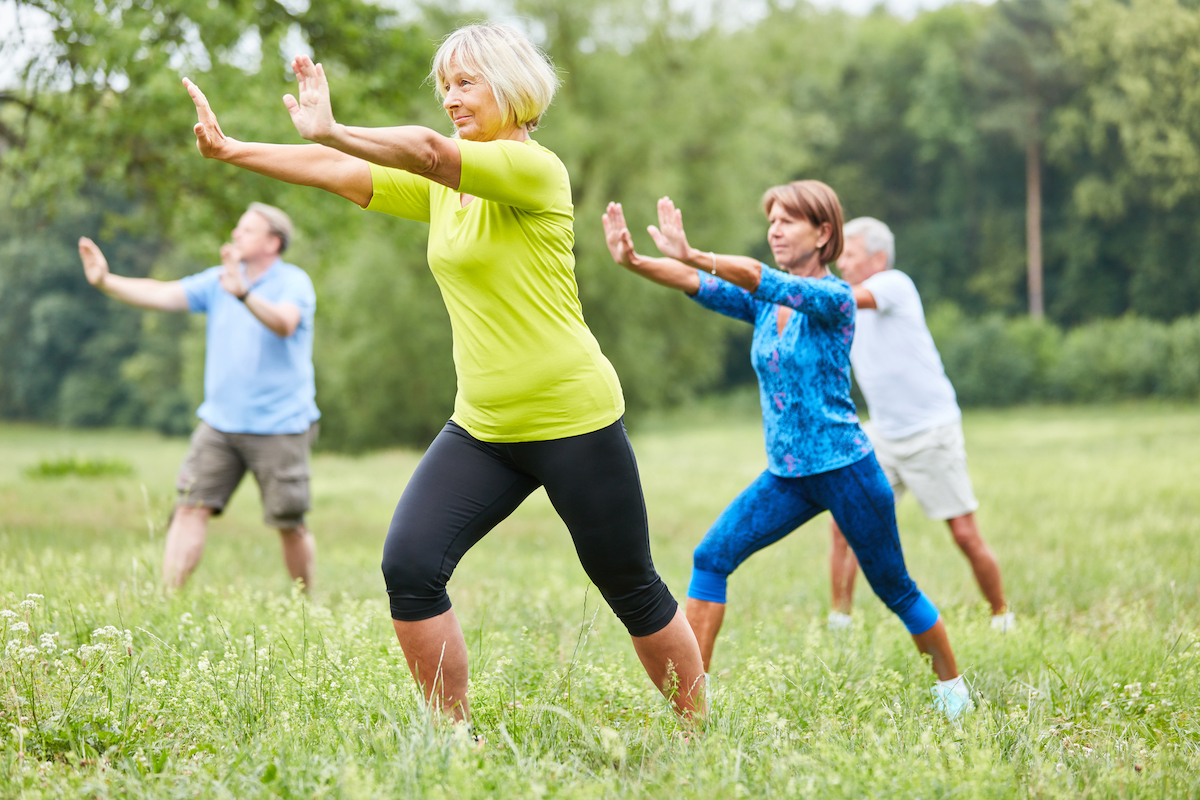New Study Reveals a Life-Altering Effect of Exercising with Others

Anyone who has felt depressed knows it's a terrible experience, and one that leads you to withdraw yourself from the world. And though it's largely known as a mental condition, the truth is, depression is something that affects the rest of your body, as well. As we've reported in the past, feeling depressed leads to more physical pain, a weaker immune system, weight gain, digestive issues, and terrible sleep. This is why countless doctors will prescribe more physical activity as a crucial way for decreasing your depressive symptoms.
"Regular exercise is an important part of managing our mood," Paul Greene, Ph.D, director of the Manhattan Center for Cognitive Behavioral Therapy, told us. "Our emotional lives are affected by our bodies and physical health, so taking care of our physical health is a part of good emotion management."
Now, a new study published in the journal Frontiers in Psychiatry reveals how just a few weeks of moderate-intensity exercise—and specifically in a group setting—can do wonders for both your mind and your body. Consider it a bonus that the study tracked participants for less than a month—so you could potentially reap the benefits in fairly short order. Read on for more of what the researchers found. And for more exercise news, read about this New Study That Revealed the Secret Trick for Getting Fit in As Little Time As Humanly Possible.
Measuring the Brain on Exercise

For the new study, conducted by researchers at the University Clinic for Psychiatry and Psychotherapy at Ruhr-Universität Bochum (RUB) at the Ostwestfalen-Lippe campus, in Germany, the researchers recruited 41 people who were being treating for depression. They were divided into two groups, "one of which completed a three-week exercise program."
The program, designed by professional sports scientists, "contained fun elements," and all of the exercises were designed to be collaborative, promote team spirit and "social togetherness," while "breaking down a fear of challenges and negative experiences with physical activity." In other words, they designed the workouts to be as friendly and non-competitive as possible.
The control group didn't exercise. Over the course of the study, the researchers measured their symptoms of depression, their negative feelings, and—perhaps most importantly—their brain's neuroplasticity via a process known as transcranial magnetic stimulation. Neuroplasticity is important, says the study, because it's defined as the brain's ability to change, and "the ability to change is important for all of the brain's learning and adaptation processes," says Karin Rosenkranz, Ph.D., Dr. med., the study's lead author. And for more life-changing exercise advice, see here for the Secret Exercise Tricks for Keeping Your Weight Down for Good.
"Physical Activity Jolts the Brain"

At the end of the 3-week program, the scientists concluded that "physical activity not only reduces depressive symptoms," but it "also increases the brain's ability to change." The study authors note that the two are inextricably linked: The more you exercise, the more your brain rewires itself, and the more your brain changes, the less feelings of depression you have.
"The results show how important seemingly simple things like physical activity are in treating and preventing illnesses such as depression," said Rosenkranz. And for great fitness advice, don't miss The Secret to Getting a Lean Body for Good, According to Science.
The Benefits of Group Exercise

It's not the first study to tout the overwhelming benefits of group exercise. According to a study published in the journal APA PsycNet, working out with others is a great way to go for one wildly obvious reason: It can simply be more fun.
"Specifically, during classes in which exercisers' perceptions of groupness were relatively higher, exercisers reported more recalled enjoyment, affective valence, and exertion," says the study. In other words, the study participants' workout experience was much more positive—and much more effective overall. And for more exercise inspiration, make sure you're aware of The One Workout That Burns Fat Faster Than Any Other, According to Science.
Group Exercise Also Sets in Motion a Virtuous Cycle

"Psychology and exercise researchers like us know that people are influenced by those around them in a few different ways," wrote L. Allison Philips, Ph.D., a professor of psychology, and Jacob Meyer, Ph.D., a professor of kinesiology, both at Iowa State University, in an article for The Washington Post. "If you get to know others who exercise regularly, you start to perceive exercise as more positive, common, desirable, and doable."
They cite a study published in the International Journal of Behavioral Nutrition and Physical Activity, which found that better physical activity—and healthier eating habits—are actually contagious. "Knowing other people who lift weights or take a spin class influences your explicit and implicit attitudes—your thoughts and feelings—about exercise," write Philips and Meyer. "It also molds what are called social norms—your perceptions about whether other people exercise and if you think you should."
Bonus: Group Exercise Can Also Help You Drop Pounds

A 2016 study published in the journal Obesity found that people who are overweight have a higher chance of dropping weight if they surround themselves with a social network that is fitter than they are. Also, the more time overweight people spent with their fit friends, the more weight they were reported to lose. Talk about a win-win. And for more on exercising for better physical and mental health, see here for the Secret Little Tricks for Getting a Lean Body Fast, Say Experts.








